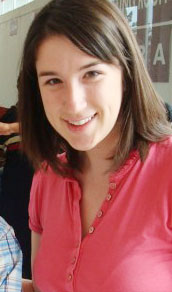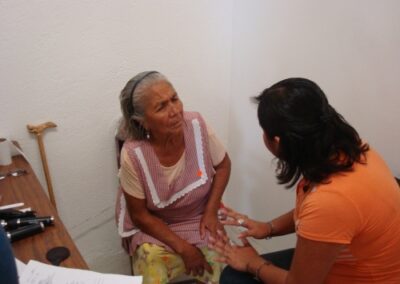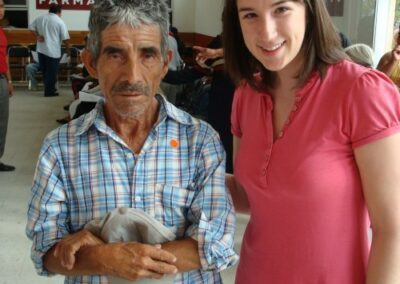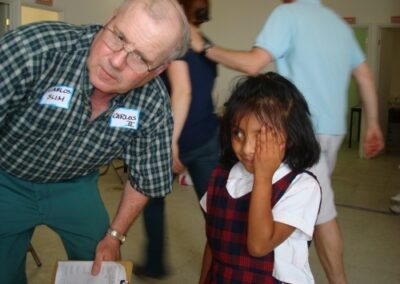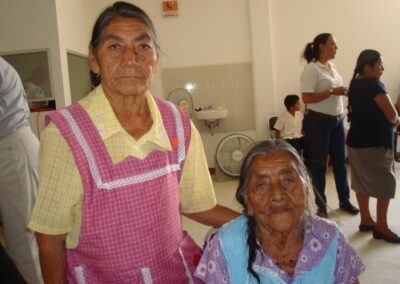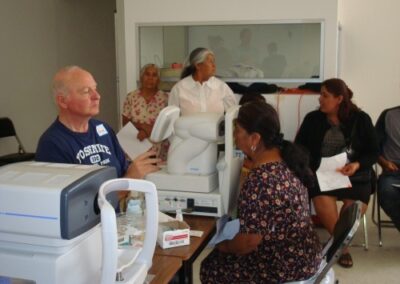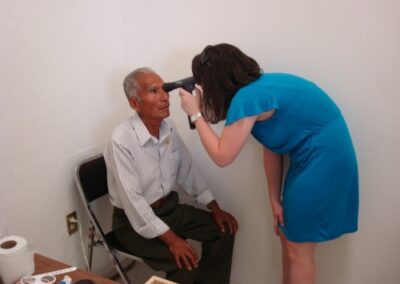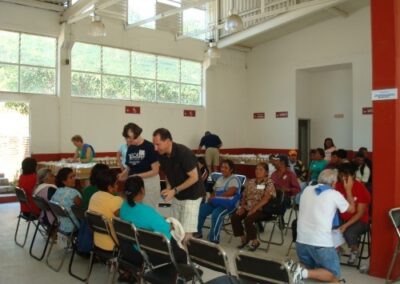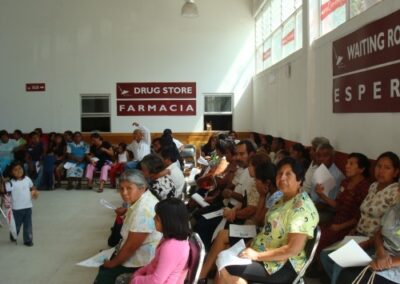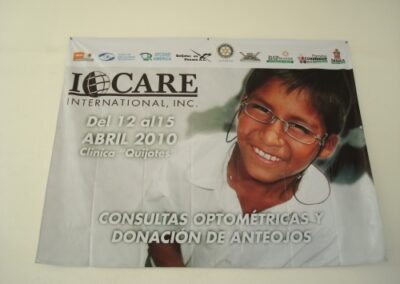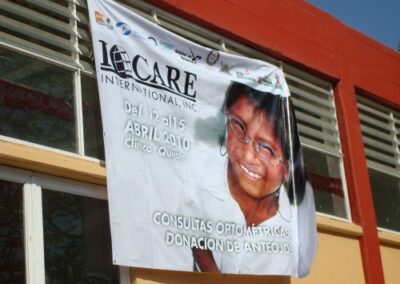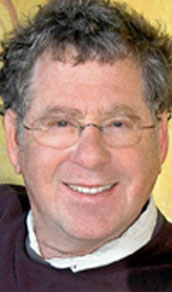Testimony
February, 2019 in Oaxaca, Mexico
A Student Optometrist’s Personal Blog by Katie Robertson
Hola!!
I am in Mexico and wanted to say a quick hi! I am getting excited about our 4-day free clinic where we will be seeing 350 people each day. Each patient gets a free exam, free glasses, free eye medications, AND free cataract surgery this Friday if they need it. I am with wonderful people, getting to see a bunch of the town, having fun with Jessie, and we get 2-day trips at the end of the week. (just hope we learn a little Spanish by tomorrow… minor detail, lol) We have 21 of us… 3 docs (1 from Mexico City 2 from Chicago), 2 students (me and Jessie), and the rest are Rotary volunteers or translators. VERY nice people. We are staying at a great hotel right by an awesome market in a plaza, eating well, and trying new drinks (but not the water!!!)
Just a quickie… Have a great week!!! More updates to come!
This is the most amazing week… but so hard!
We have seen about 1300 patients so far in 3 days and 125 today in the first hour!! (and I see about a fourth of all the patients by myself! same for Jessie!) So many hugs, kisses, and tears (them and me!) It is so amazing when you can help a patient who has been blind for 3 years get free cataract surgery to restore sight, a 6 diopter myope see details and faces for the first time, a strabismic amblyope 9-year-old straighten his eyes for the first time, and save him from losing all sight in one eye, save the person from becoming completely blind in a year from glaucoma… and the list goes on.
But I have cried so many times over patients that we haven’t been able to help… but goes around thanking all of us many times. It is so heartbreaking knowing that in the states we could do so much more, but they are still so grateful that we tried. (haha, thinking about it now literally makes me tear up. I’m a crier this week!) And all the ones we had to turn away today because of the volume of patients. A constant line of about 50 patients wait outside 100 inside, and another 50 somewhere in the building being tested. The constant flow is so amazing (because you can see how many people we are helping) but also heartbreaking (because of the 100 we had to turn away today). All we can do is hope they come back tomorrow.
The amount of pathology that I have seen is just insane. PLEASE, EAT HEALTHY, WEAR SUNGLASSES, EXERCISE, GO TO THE DOCTOR, and take care of yourself. We are SOOOOO lucky to be in a nation that has the technology, and the health care system that takes care of our own. Count your blessings.
The second installment has to be about my patients. After all, that is why I went down to Mexico in the first place. I knew I would learn a lot about seeing a million patients in a short time, special populations, diseases, and perfecting some clinical skills… but I had no idea that I would learn so much about myself and the wonderful people I did my exams on. I know that this is a little long-winded, but I want to write it all down because I don’t want to ever forget these stories.
******disclaimer: Just for clarification, I will not going to use any names or identifying details of the patients in these blogs because I want to protect their privacy. Also, I asked permission for each of the photos taken. I would never want to take my patient’s privacy for granted! *******
Living and working in St Louis, I see a lot of patients that live in poverty but this was a whole new level. Oaxaca, a state in southern Mexico, is the second poorest state in the country. Only 5% of the population are rich (being able to eat in restaurants, drive cars, and live in a nice apartment) while the rest of the 95% are poor. It never occurred to me that being able to eat in a restaurant is considered to be such a privilege.
Our clinic (a converted old slaughterhouse) was in the town of Xoxocotlan in Oaxaca. People traveled from all over the surrounding area (sometimes for hours) to come and see us. Since Oaxaca has hundreds of mountains, many indigenous groups are scattered about the state. Most have their own unique culture and sometimes have their own languages. This made it hard to communicate sometimes because our translators did not even know what they were saying, but it was so amazing to see the differences between the groups. Some of the men wore the same type of cowboy hat with straps, some of the women had their hair braided a certain way with a colorful ribbon woven in, some wore homemade aprons to dress up for us, and they would all act as a huge family.
My favorite man on the trip was at the end of the second day. I did an exam and knew that there was not a lot to do for this 76-year-old guy. One cornea was completely white from an infection he had gotten from the unclean water and he will never be able to regain sight in that eye. The other eye had macular degeneration and a growing dense cataract. The family would not let him get the cataract surgery that he needed because they thought it was too risky (more on this later!). I could not do a lot. With more equipment and technology, I could have done more, but that day I could only give him a pair of glasses that improved his vision to the second line on the chart. I was devastated, but I was brought to tears when he received his glasses and with a huge smile on his face went around to every volunteer (even the ones who didn’t help him directly), hugged or shook their hands and thanked them for coming and helping him be able to see again. I looked at Jessie and we both lost it. These people are so grateful, and we did nothing (at least in American standards) to really help. That little old man will always be in my heart and I will never forget him.
So many patients in our clinic were beyond help that we could give them. We had 3 diagnostic sets (Jessie, Tania and me were the only ones to bring equipment), a slit lamp but no high powered lenses to do full dilated exams, 2 auto refractors, a tonopen (thank goodness!! but too few tips to use on 1/100 the people) no BIOs (big headlamp we use), a couple bags of drops (lifesavers for soooo many!!) and photocopied VA charts. That was is. Seems like a lot, but not 1/4 of the stuff that we would like. Not saying that the mission wasn’t prepared, but there is just no way to bring everything down through customs and down to where we needed it.
One of Jessie’s patients (who was 99!!) moved me too. He came into her exam room pretty much feeling his way around because he was almost completely blind. The other doctor in the room (Tania, an amazing doc from Mexico city who I will talk about later) told her that there was pretty much nothing that could be done. But Jessie decided to try anyways. After a trial frame refraction (finding the correct prescription the long way because the auto-refractor wouldn’t work on him), she put the makeshift glasses on him and with a HUGE smile on his face he said “Es mejor!” which means ‘it is better’. She didn’t even have to ask. It surprised both Tania and Jessie. Jessie changed that mans life by giving him independence and quality of life back. I am so proud of her that she spend the extra few minutes to try.
A happy feeling story was my 9 year old patient (mentioned in previous post) who had crossed eyes and the turned one was beginning to become amblyopic (lazy eye). I started to explain to my translator to tell the kid’s mother that his eye was probably going to stay worse than the other one for the rest of his life and all we could do was just patch the good eye to help train the bad one to work harder and regain function. But then I noticed that he was alternating a little. I took acuities another time and did a trial frame refraction on the boy. Once I put in the correct prescription, his eyes straightened. I had Tania (the BV specialist from Mexico city) recheck it, and she said I was correct!! All this time, the boy only needed a set of glasses. His eye now will be functional since we caught it when he was so young. A couple more years, and it would be fully amblyopic. His mom and him were thrilled! Dan (one of the doctors) is going to make him a pair of glasses with the exact prescription and send then to him.
An amazing thing that the ICare trips provide is free cataract surgeries. We signed up 75 patients for desperately needed surgeries. I cannot tell you how many patients I had with cataracts, but the ones that stuck with me were the ones who were down to FC at 3 feet (Finger Counting aka not even able to see the big E on the chart) and all they needed was a surgery to see again. He was a poor farmer and even though he knew he needed surgery many years ago, he just had to deal with the fact that he was going blind. In the US, when someone drops down to 20/40 (legal limit for daytime driving so a little worse than 20/20 normal vision) we recommend surgery. This man never had that option. Until now. He left that day with his name on the free cataract surgery list and with a pair of glasses in hand so he can finally read large print and be able to see details at far (like peoples faces). He was so happy and grateful.
Another girl who touched my heart was about my age. I have a high prescription but I have always been blessed to have my parents spend the money on the best eye exams every year, new glasses every time, hard contacts to try to slow down the progression of my myopia, soft contacts for better comfort when I was having problems with the hard, and the works. This girl never had that chance. She had a 3 year old boy and was working and running after him playing with a prescription of -6 with a -3 cyl… Once I gave her the glasses she was amazed how great it was to see his face and be able to function. She was waiting around for a bus or ride till after we were all packed up for the day. So what did Jim (our fearless leader) do? She hopped on the bus with us and we gave her a ride into town. My team was amazing… you can tell that each one of us cared for the patient as well as the person outside the exam. Love them.
My last patient of the week was also very special to me. She grabbed me and hugged me after the exam was over thanking me for coming down to Mexico and giving them a chance to get free glasses and get some quality of life back. She pointed to her heart and heaven and spouted out a stream of Spanish I could not quite understand. I said gracias even though I only understood about every 3rd word and helped her to the dispensary. My translator came up when I got back and told me what the woman had said. She said that me and the other volunteers have touched her and would always be in her heart, and that she would pray every day for me and the entire team. I am glad that I didn’t understand her at the time, because those sweet words made me tear up. I saw her only for 5 minutes an all I really did was prescribe glasses!!!!
The people we saw were amazing. All dressed up in their nicest clothes, and on their best behavior (even the children) stood in lines for hours, in the hot sun, sunburned by the time they got inside to wait for another hour, to go through the assembly line of entrance tests to get to the 5 minute exam with the doctors, and then wait longer for glasses that were close but not exactly the prescription that they needed. And they hugged us, cried tears of joy, laughed, shook our hands and prayed for each and every one of us. These patients will always be in my heart.
Mission trip to Guatemala 2006
Thomas Ripper, Volunteer
A Personal Testimony by Dr. Thomas Rippner
I have recently participated in an eye mission trip to Guatemala with I Care International. I was fortunate to have my wife, Sharon, joined me on this trip. Since my return, I have had an opportunity to reflect on my journey and experiences there.
I felt and continue to feel that it was a privilege to have this opportunity to utilize my skills as an optometrist, to be part of a team effort, and to be able to improve the quality of life of others without any exchange of monies. The compensation is “only” an inner gratification of performing this service and allowing the “Thank You” to come, uninvited, from those we have helped.
Our trip involved a long plane ride to our destination and considerable financial expense but the experience was priceless. In the evening, after a day of long hours of clinic, over a cold beverage, we share stories of unbelievable bad fortune of the human condition that we have just witnessed as well as the heart warming interactions we have had with our patients. Always there is some experience which sends the whole group into unabashed laughter. Our team consisted of 4 experienced Optometrists, 2 optometry students, and 21 non professional persons who, though not trained in eye issues, were vital contributors to our overall effort. The patients would often stand outside the clinic building for several hours before we began the process. When it was their turn, the patients would register, give their eye complaints and brief medical history, then go to an acuity station. From there, they would be scanned by an “auto refractor” and then would be directed to one of us “docs”. Most of the patients received eyeglasses of some sort to correct their vision problems. In addition, artificial tears, anti-histamine and anti-biotic drops, and, in some cases, eye drops to lower eye pressure in those who were diagnosed to have glaucoma were administered along with information and education about their eye problems and solutions to those problems. We were examining upwards of 400-500 patients a day, and there was a significant amount of eye pathology in this underserved and poor population. We were able to dilate their eyes, check eye pressure, and if needed, direct them to a local surgical clinic where free cataract surgery was performed and complex medical problems could be addressed and treated at no charge to the patients or their families.
Life is hard, really difficult, for most of the individuals who came to our clinic. No social security checks in the mail here, only much hard work. For instance, the 75 year old man who, hoping to make a bit of money to buy his food and pay some bills, was pushing a small ice cream cart up and down the steep hills. Most of the people who came to our clinic had never visited an eye doctor or had the money to buy glasses. Though very proud, family-oriented and hard working, they have minimal, if any, opportunity to better themselves. There is perhaps some progress being made in this regard, but it is achingly slow. Children do now attend some school but many need to drop out by the 3rd grade to work to help the family survive. By contrast, the West seems so outrageously wealthy, at least by our middle class standards. I have heard that 1 out of 3 people in the world live below the poverty line and it seems that what they could use most is not a “Hand Out” but a “Hand Up” to improve their quality of water, sewage control, basic medical care and the encouragement and money to emphasize education.
As Katrina was devastating New Orleans last year, the hurricanes brought tragedy to Guatemala. A landslide caused by the heavy rains buried a whole village, entombing hundred of people under 30 ft of mud and debris. Some of us were able to tour the site of this violent side of nature and just shake our heads and feel the heartache of this experience with its continuing grief. Returning to the Central Coast of California, I certainly have had an expanded view of the world, and seem to whine less about the “small stuff.” I realize that most of humanity does not have all we have here in the US but for the good fortune of being born here, my life experience could have been much different. In doing this type of service, I feel a deep satisfaction and happiness. The service is not a “should” but a natural out growth of much personal satisfaction and gratitude for my good fortune.

